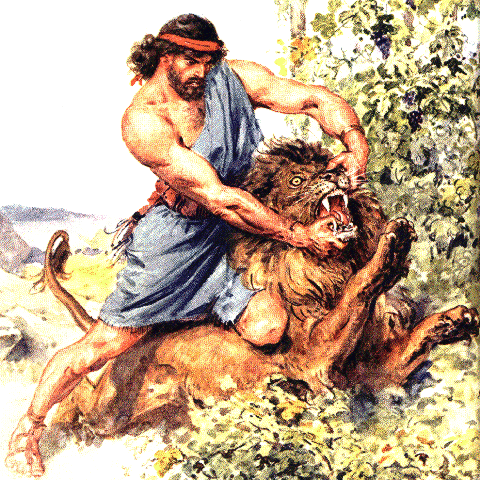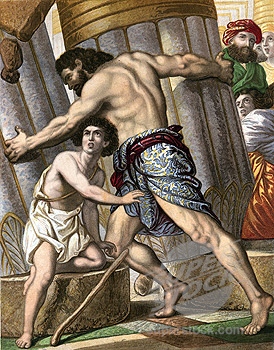

24
OLD TESTAMENT ESSAYS
 Why the Need for Judges Arose
Why the Need for Judges Arose
During the Settlement Period:
Samson and Deborah
(23 December 1983)
by Christopher C. Warren, M.A.(Oxon)

In the absence of strong religious leaders like Moses and Joshua, there was a strong tendency towards religious syncretism. Whilst continuing to worship Yahweh as their Deliverer and Elohim (God), there was a strong temptation to turn to the Baals for success in agriculture. The nomadic Israelites inherited a more sophisticated Canaanite culture and were inevitably strongly influenced by it. Had they fulfilled the command of Yahweh to totally destroy the Canaanites in thre land, this temptation might not have been so strong. Coming from the desert where they had been fed miraculously with manna for many decades, the Israelites were faced with the problem of settling down and learning the arts of agriculture. Their superstitions convinced then that the Canaanites had found the answers to the problems of fertility and rain and they therefore imitated the Canaanite Ball cult practices. As the Canaanite religious system became more and more ingrained in Israelite society it is likely thgat they neglected their Yahweh worship and gradually adopted Baal worship wholesale.
With such corruption so apparently easy the need for judges to rescue Israel spiritually as well as militarily becomes obvious. Because Israel broke her covenants by adopting heathen practices, Yahweh allowed heathen neighbours like the Philistines, Ammonites, Midianites, Amalekites, Moabites, mesopotamians and Canaanites to subdue the land as an inducement to natioonal repentance. Only when rebellious Israel that the calamities that had befallen her were the result of forsaking Yahweh did a judge, or national 'saviour', emerge to drive out the occupying nations. Whilst the judge remained alive, proper Yahweh worship was maintained. But dollowing the judge's death, there was a soon a reversion to Baal worship. There could be two reasons for this:
- 1. The inherent wickedness of human nature, in this case, Israelite human nature; or
- 2. A genuine ignorance of the importance of monotheistic faith
The second suggestion gains support from the observation that some of Israel's judges were not exactly true Yahweh-worshippers themselves. One was a notorious fornicator (Samson), another a child-sacrificer (Jephthah), one a cold-blooded assassin (Ehud), etc.. Each perceived Yahweh worship on his own terms; the apostacy from true worship was so extensive that no one apparently knew what it was. Their justification was their faith and not necessarily true Yahweh-worship. They were more military saviours than judges and compare quite differently from with the last judge, Samuel., who know true Yahweh-worship in his capacity as Cohen gadol or High Priest as well as military leader. Thus the rôle of the judge during the early settlement period was important:
- 1. To save the nation from invaders; and
- 2. To point the nation in the general direction of monotheistic Yahweh-worship.
A. SAMSON
 The 12th of Israel's judges was Samson although it is not too clear that he either 'judged' or acted in the interest of the nation as a whole. He has been called by some commentators various as an 'Israelite Tarzan' and a 'one-man liberation army'. Though a Nazirite his promiscuity hardly reflected well on his Yahweh-worship. His ventures against the Philistines were a response not so much to Israelite oppression at the hands of Philistia as a personal vendetta. His heroic deeds are very likely exaggerated; his justification was, like the other judges, on the basis of faith rather than on righteous conduct. He could well be described as an egocentric sex-maniac with a faith in the warrior-Elohim Yahweh. As fas as Israel as a whole was concerned his importance was probably minimal; his importance lies in an example of individual faith and daring in the midst of affliction in his defeat of the Philistines at Lehi and in the Temple of Dagon.
The 12th of Israel's judges was Samson although it is not too clear that he either 'judged' or acted in the interest of the nation as a whole. He has been called by some commentators various as an 'Israelite Tarzan' and a 'one-man liberation army'. Though a Nazirite his promiscuity hardly reflected well on his Yahweh-worship. His ventures against the Philistines were a response not so much to Israelite oppression at the hands of Philistia as a personal vendetta. His heroic deeds are very likely exaggerated; his justification was, like the other judges, on the basis of faith rather than on righteous conduct. He could well be described as an egocentric sex-maniac with a faith in the warrior-Elohim Yahweh. As fas as Israel as a whole was concerned his importance was probably minimal; his importance lies in an example of individual faith and daring in the midst of affliction in his defeat of the Philistines at Lehi and in the Temple of Dagon.
B. DEBORAH
 By contrast the judge and prophetess Deborah (Hebrew, devorah, a 'bee') had a profound effect on the Israelite nation as a whole. In league with her military commander, Barak, she was able to repell and defeat the combined Canaanite armies led by Sisera, commander of the forces of King Jabin II of Hazor. Deborah was also very definitely a judge who held court between Ramah and Bethel under "the palm tree of Deborah" in the hill country according to the correct pattern which may be evidenced by her prophetic abilities. She handled disputes between the tribes and cases which the local judges found intractable. Israel was not to have trouble from the Canaanite population for centuries after the great battle of Tabor. The wife of Lappidoth (Judg.4:4) and a "mother in Israel" (Judg.5:7), her song of victory (Judg,5:2-31a) is recorded in one of the most archaic passages in the Old Testament. The vivid and moving description of Sisera's mother (vv.28ff) would appear to confirm the feminine authorship of the song, betraying compassionate sympathy. Thus Deborah played a profound rôle in Israel's destiny.
By contrast the judge and prophetess Deborah (Hebrew, devorah, a 'bee') had a profound effect on the Israelite nation as a whole. In league with her military commander, Barak, she was able to repell and defeat the combined Canaanite armies led by Sisera, commander of the forces of King Jabin II of Hazor. Deborah was also very definitely a judge who held court between Ramah and Bethel under "the palm tree of Deborah" in the hill country according to the correct pattern which may be evidenced by her prophetic abilities. She handled disputes between the tribes and cases which the local judges found intractable. Israel was not to have trouble from the Canaanite population for centuries after the great battle of Tabor. The wife of Lappidoth (Judg.4:4) and a "mother in Israel" (Judg.5:7), her song of victory (Judg,5:2-31a) is recorded in one of the most archaic passages in the Old Testament. The vivid and moving description of Sisera's mother (vv.28ff) would appear to confirm the feminine authorship of the song, betraying compassionate sympathy. Thus Deborah played a profound rôle in Israel's destiny.


This page was created on 11 August 2009
Updated on 22 March 2021
Copyright © 1987-2021 NCAY - All Rights Reserved



